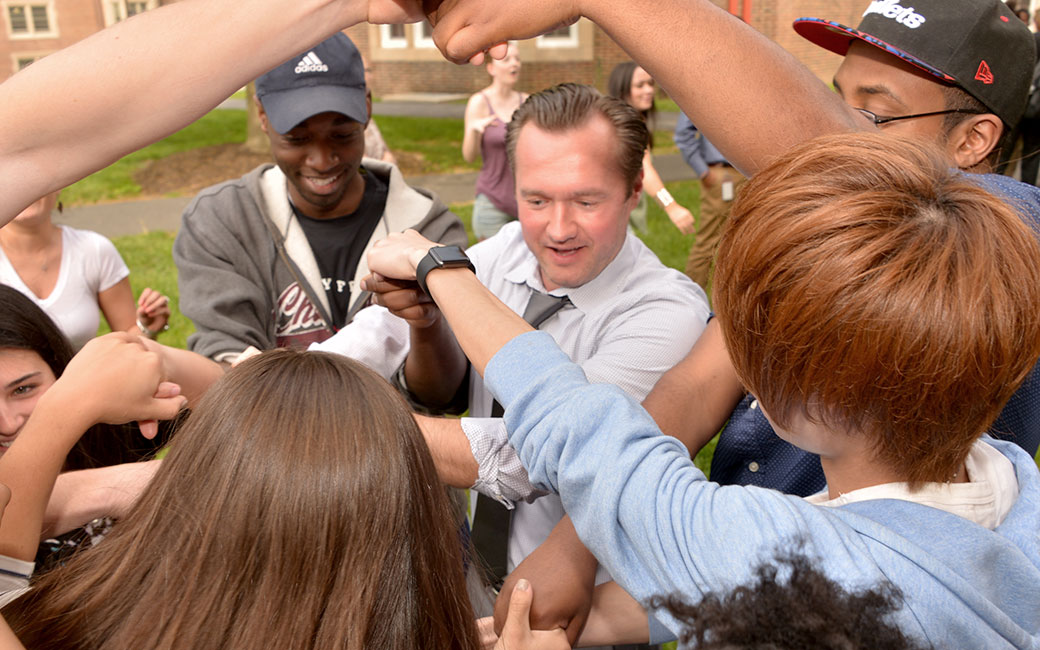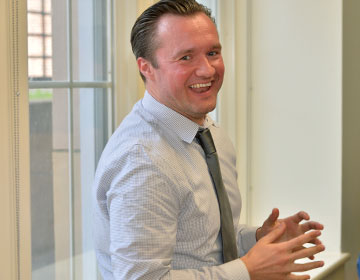Acting the part: Bart Debicki as professor and actor
CBE assistant professor Bart Debicki is equally at home treading the boards and teaching his classes.
By Megan Bradshaw on June 1, 2016

If you Google a professor’s name, you’re expecting to find his or her university, a list of publications, and maybe some hits on news articles he or she is quoted in.
You do not expect to find an Internet Movie Database (IMDB.com) site.
Bart Debicki, an assistant professor of management in Towson University’s College of Business & Economics (CBE), is an exception. Coming from a family of academics, he was the black sheep who went into retail marketing. Eventually, however, the lure of scholarship pulled him back into the family fold. But when the pressures of pursuing an advanced degree took their toll, Debicki looked for an outlet.
“When I was finishing my doctorate, I started looking for ways to relax and do something different,” he said. “I’m from Poland originally, and in Europe, you don’t do amateur acting. If you want to get into it, you have to do it professionally right from the start.
“In rural Mississippi [where he earned his Ph.D.], there was this one regional theater. I went there to audition and that’s how I got started. After I was done with that show, we moved to Baltimore and I started getting involved with the theaters around here. That progressed to camera work and working with different agents.”
When he and his wife moved to Maryland, he immediately established roots in the area theater scene, performing in shows at the Audrey Herman Spotlighters Theatre and Fells Point Corner Theatre. He even landed a part on Netflix’s “House of Cards,” which has filmed at TU locations.
Debicki is on the tenure track in CBE, but he has managed to work his hobby into his profession.
“The two maybe don’t go hand-in-hand, but there are certainly aspects of one in the other. There is certainly acting in class instruction. It’s a bit of a performance if you want to make it interesting, and that’s what I try to do.”

The performances aren’t just limited to his lectures. Debicki often assigns role-playing and simulation exercises to students, like negotiations, motivational rallies and students acting as professors to teach their classmates business concepts.
“It’s usually a lot of fun. I think it’s a nice surprise for them,” Debicki noted. “I think they enjoy the fact they can actually do something that’s a bit more creative rather than sit in a lecture. So every time we do any type of exercise that’s a little more involved on their part in class, it seems to bring the energy level.”
Debicki thinks the faculty could also benefit from injecting performance into the classroom.
Together with Julita Haber, a colleague at Fordham University, he has created “Act on Your Research,” a contest now in its third year at the annual Southern Management Conference.
“We have professors and researchers make movies about their research so they can show them to students who are interested in what the professors are doing outside the classroom,” he said. “It was amazing to see all these professors who are researchers get into this creative process of [making] movies and performances, engaging their students and colleagues and really getting into the edits and soundtrack.”
In the first year, seven teams participated. It was so well received, 27 teams signed up for the second year. This fall, Debicki and Haber will once again run the contest, and Debicki is expecting another large turnout.
“I think the creation of a movie about the research has several purposes,” he said. “First, it’s just a different approach that takes them out of their element a bit. A lot of times we become so theoretical, we forget what it actually means. At some point, it has to be useful. What this [contest] makes them think about right at the start of the creative process is, ‘how does this apply to a real-world situation?’”
Debicki knows what might be a stimulating chat between colleagues can leave others uninterested.
“Second, so when students ask you about your research, professors can break into a two-hour monologue, and people usually just kind of fall asleep. So we try to encourage professors to make a five-minute, interesting thing that people can watch in classes and [show in] interactions with students. It just becomes a much more approachable way of explaining what we do."